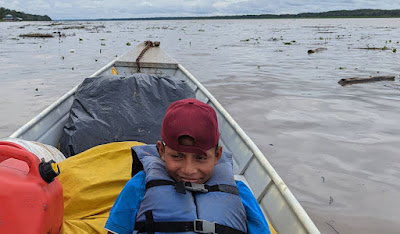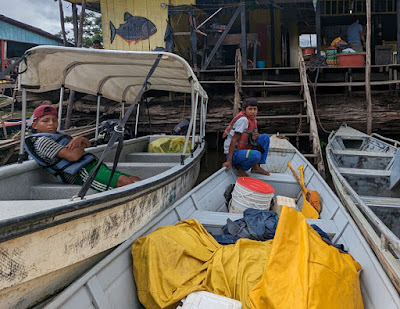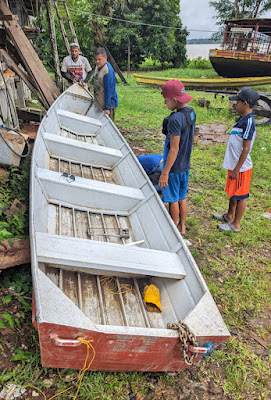The dangers of river travel.
In January, the river was rising. The river may rise by up to 25 feet between its lowest (dry season) and highest (rainy season). We had just taken our boat out of storage and traveled to Leticia to resupply.
 |
| Passing through a floating debris zone. |
It had been raining for the past three days. The river was rising rapidly. When it rises, vegetation, sticks, and logs along the river banks and tributaries are carried downriver with the current. Depending on the current, it collects into dense patches in some places. We always drive more slowly through these zones.
The floating debris is easy to spot and move around. The danger comes from logs that float just below the water's surface. As long as we move slowly, these aren't too much of a problem. What we fear most is when one of these submerged logs breaks free of the pack and is randomly floating below the surface of what we think is clear water. In clear water, we travel up to 30 km per hour. Hitting a large submerged log at this speed can be disastrous.
 |
| After unpacking the boat, we knew we had a serious problem. |
On the trip downriver, we struck a large submerged log in what we thought was clear water. The force of it was enough to knock us out of our seats and send us sprawling forward. Our pilot lost his grip on the tiller of the motor. The thing that saved us was that we struck the log straight on. It would have flipped the boat if we had struck it at an angle.
We shut down the motor and inspected it for damage. The motor seemed fine. However, we did notice a rattling on the floor of the boat. After arriving at our destination in Leticia, we saw that the impact of the log was forceful enough to break five of the welds between the deck of our boat and the structural reinforcers which run along the floor. If the deck is not supported, it with lead to the failure of the seams which hold the deck to the boat's sides. In other words, we could sink rapidly. It had to be fixed.
After asking in the port of Leticia, we found a shipyard in the neighboring city of Tabating, Brazil, where they could repair it. Our boat is made of aluminum, so the welder needed to be skilled and have a specialized MIG welder. We left Leticia early the next morning to find him.
 |
| Estimating the damage. |
When we got to the boatyard, the welder said he could fix it. He also recommended reinforcing the other welds on the deck, to which we agreed. He estimated that after wrapping up a job he was currently doing, it would be ready within three hours. This gave us time to look around the boatyard and get a snack in town before eating lunch at noon.




No comments:
Post a Comment